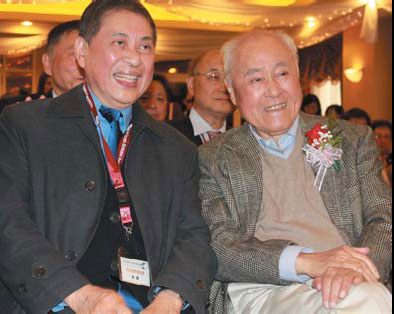Writers in N America hew to Chinese roots for literary inspiration
Updated: 2012-10-05 11:53
By Wei Wei and Wang Bowen (China Daily)
|
||||||||
|
Author Bai Xianyong (left) and literary critic Hsia Chih-tsing were guest speakers at the fall convention of the North America Chinese Writers' Association on Sept 29 in New York. Wei Wei / For China Daily |
Over the last half-century, Chinese-American authors such as Amy Tan (The Joy Luck Club), Maxine Hong Kingston (The Woman Warrior) and Lisa See (Snow Flower and the Secret Fan), have popularized fiction about the lives of native Chinese and their immigrant descendants in the US.
The North America Chinese Writers' Association celebrated that evolving tradition at its annual convention, held this year in New York. The organization, founded in 1992, has about 1,500 members in 26 branches in the United States and Canada.
"NACWA provides all kinds of exchange trips to writers who identify as Chinese, and who contribute to the creation of overseas Chinese literature and add to its value," said Zhou Yunzhi, president of the New York branch.
The Sept 29 convention featured speeches by World Chinese Writers Association vice-president Zhao Shu Xia and author Bai Xianyong (also known as Pai Hsien-yung), who is perhaps best known for Taipei People, a short-story collection published in 1971.
Bai, a renowned writer from Taiwan, studied in the US in his 20s and now teaches Chinese literature at the University of California, Santa Barbara. He made his name by depicting immigrant life.
"Standing in Times Square with sunglasses and impelled forward by the stream of people, I feel I am such a tiny little thing when looking at the skyscrapers. Diving in the stream, I find genuine freedom: a freedom that no one stays with you and no one cares about you," Bai wrote in his 2010 novel, New Yorkers.
In addition to the yearly convention, the writers association hosts speeches, panels and writing tutorials for its members. In August, NACWA members wrote and recited poems for the Dragon Boat Festival in memory of ancient Chinese poet Qu Yuan, said Zhou. They will celebrate Christmas in similar fashion.
Movie director Ang Lee, critic and academic Hsia Chih-tsing (also known as CT Hsia) and Bai have all addressed the organization in the past. Hsia's A History of Modern Chinese Fiction, first published in 1961 and now in its third edition, was a groundbreaking work that brought literature from contemporary China to the Western attention.
Ethnic Chinese writers in the United States have mined - in novels, essays, poems and screenplays - assimilation, cross-cultural divisions and the blending of American and Chinese social customs.
Most NACWA members, like Cong Su, who works at a library in New York, write in their spare time but don't make their living as writers, Zhou said.
"That's why NACWA came into existence. People may not produce significant work but can make great friends through writing," he said.
Not being "fully Chinese" doesn't diminish the work of Chinese-American writers.
"Many can't even speak Chinese," Zhou said, "but their writing never strays far from Chinese culture, and their close connection with China is reflected in the fact that many of them still like to eat fried rice or Chinese noodles."
For Cong, writing has been an outlet of expression regarding her life as an immigrant from Taiwan. While the writing process can be lonely, NACWA offers a chance to bond with other writers.
"It was at the peak of the Cold War and the tensions across the Strait were building up," Cong said of her initial desire to write. "I felt so unsafe; I worried that World War III might break out. Worse still, I could only talk to my family once a year because it was too expensive to call them.
"Writing became my way out."
China Daily

 Relief reaches isolated village
Relief reaches isolated village
 Rainfall poses new threats to quake-hit region
Rainfall poses new threats to quake-hit region
 Funerals begin for Boston bombing victims
Funerals begin for Boston bombing victims
 Quake takeaway from China's Air Force
Quake takeaway from China's Air Force
 Obama celebrates young inventors at science fair
Obama celebrates young inventors at science fair
 Earth Day marked around the world
Earth Day marked around the world
 Volunteer team helping students find sense of normalcy
Volunteer team helping students find sense of normalcy
 Ethnic groups quick to join rescue efforts
Ethnic groups quick to join rescue efforts
Most Viewed
Editor's Picks

|

|

|

|

|

|
Today's Top News
Health new priority for quake zone
Xi meets US top military officer
Japan's boats driven out of Diaoyu
China mulls online shopping legislation
Bird flu death toll rises to 22
Putin appoints new ambassador to China
Japanese ships blocked from Diaoyu Islands
Inspired by Guan, more Chinese pick up golf
US Weekly

|

|







